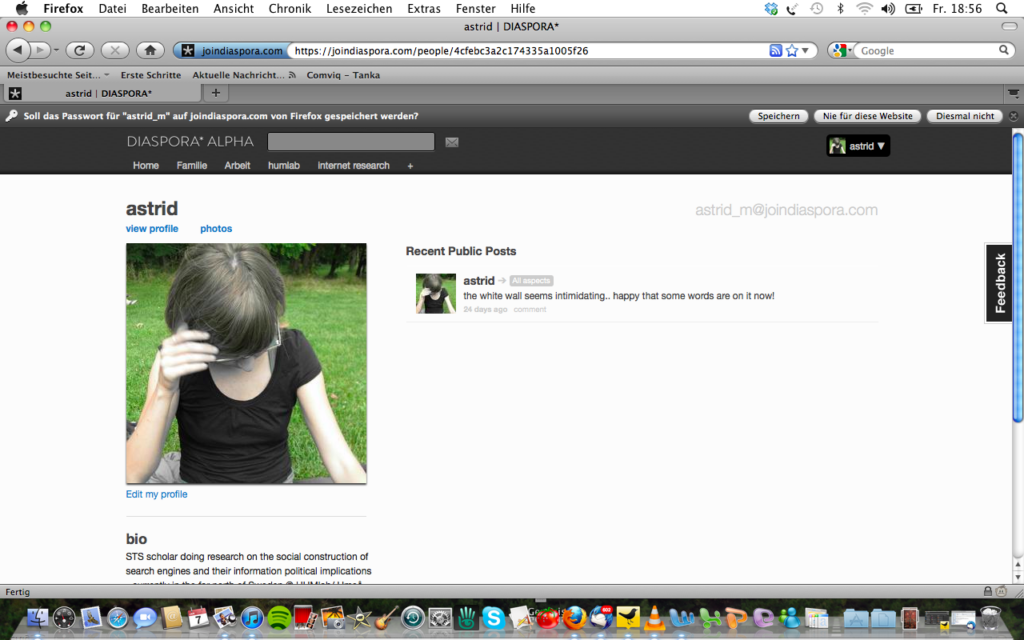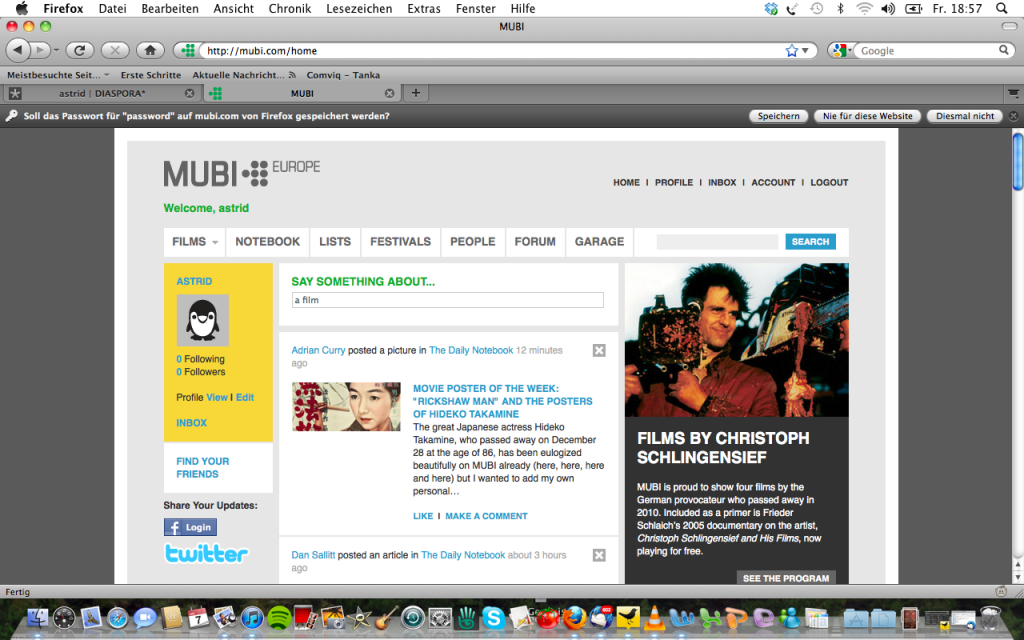I’m happy to announce that my paper “Algorithmic Ideology: How capitalist society shapes search engines” has been accepted at the OII conference in September (with thanks to Ken Hillis for the inspiration to the title). The conference “A Decade in Internet Time: Symposium on the Dynamics of the Internet and Society” has the central goal to critically assess the last decade of social research on the Internet and identify directions for research over the next. Further, the 10th anniversery of the founding of the OII will be celebrated. The line-up of the speakers is highly impressive: Manuel Castells, Vint Cerf, Dr. Laura DeNardis, Professor William H. Dutton, Andrew Graham, Eszter Hargittai, Brian Loader, Dr. Lisa Nakamura, Dr. Victoria Nash, and last but not least Professor Barry Wellman. I’m particularly looking forward to discuss my paper in the audience of Manuel Castells or Vint Cerf – who both will certainly have to say a lot about the development of search technology/ Google in the context of capitalist society/ the information economy. For further information on the conference topics, speakers & registration, please go to the conference website (credits for the image OII).
Monthly Archives: January 2011
goodtosee #1: diaspora & mubi
After a great time in Vienna, Linz and Tirol I’ve returned to Umeå, where the snow is still piling up. Although I’m not a big fan of New Year’s resolutions I thought to clean up my life a little bit over the turn of the year. The probably most liberating decision was to drop the idea of turning my PhD into a book. Instead of reworking the same piece of text over and over again or paying a lot of money to get it out there as a book, I’ve decided to put it online and upload it on textfeld, an Austrian platform for sharing and discussing academic work. Further, I’m working on journal articles, that are much more fun to write anyway. Blog-wise I’ve decided to introduce a new rubrique aiming at discussing one website, initiative, institution, or online platform I find worth to spread per month. I call it goodtosee.
To start with – and against my own idea of discussing one site per month – I start out with discussing two social networking sites: Diaspora and MUBI. Invited by my colleague Jana Herwig I joined Diaspora just to see what it’s like. Created as an alternative to Facebook, which spams you with news, apps and ads, Diaspora looks minimal and friendly.
 Instead of “friends” you add “family” or “work”-related people or whatever category you invent yourself. This seems sympathetic since the one-size-fits-all friends category has become empty anyway. Further, the lack of advertising and news spam is extremely pleasant. Despite the sympathy I have for the platform I haven’t really figured out what to do with it yet. Browsing the profiles of my – so far – two contacts makes it hard to see what their social relations are, also because the news channel is lacking. So the social surveillance we’ve learnt on Facebook doesn’t quite work here. Further, the function of importing images, links to websites, or youtube movies seems to be complicated, if possible at all, which makes it hard for me to get started. The reason for that might be just my own incapability to let go of all the annoying, but at the same time handy features I got used to on Facebook. Or the lack of friends or rather lack of “family” and “work” I have on Diaspora. In any case I’m curious about the platform’s further development – it’s an alpha version and feed-back is appreciated – and whether I’ll be part of it. Let me know if you wanna try it out yourself; I’ve still some invitations and would be interested what you think of it!
Instead of “friends” you add “family” or “work”-related people or whatever category you invent yourself. This seems sympathetic since the one-size-fits-all friends category has become empty anyway. Further, the lack of advertising and news spam is extremely pleasant. Despite the sympathy I have for the platform I haven’t really figured out what to do with it yet. Browsing the profiles of my – so far – two contacts makes it hard to see what their social relations are, also because the news channel is lacking. So the social surveillance we’ve learnt on Facebook doesn’t quite work here. Further, the function of importing images, links to websites, or youtube movies seems to be complicated, if possible at all, which makes it hard for me to get started. The reason for that might be just my own incapability to let go of all the annoying, but at the same time handy features I got used to on Facebook. Or the lack of friends or rather lack of “family” and “work” I have on Diaspora. In any case I’m curious about the platform’s further development – it’s an alpha version and feed-back is appreciated – and whether I’ll be part of it. Let me know if you wanna try it out yourself; I’ve still some invitations and would be interested what you think of it!
The second platform worth mentioning is MUBI. MUBI is an African city, but it’s also a social network dedicated to watching, sharing and discussing movies. The platform is more intuitive than Diaspora since it has all the basic features we got used to in the past: It has a news channel, it links to Facebook and Twitter, and it provides you with a profile you can design with the help of familiar features.
 Its main purpose, however, is to offer a movie database and stream all types of movies, from classics to recent films, for a small amount of money (1-3 Euros). The movies that are top-rated and thus presented to users on the homepage are no blockbusters, but films usually shown at small film festivals around the world. This makes the platform immediately interesting to me, not to speak of the films by Christoph Schlingensief that are featured as well. When digging into the films, however, one big problem occurs: due to different copyright regulations in different countries not all films may be watched in all countries.. so it’s a bit of a lottery whether you can actually watch the movie you wanna see. Hence, if you’d like to watch old classics the Internet Archive might actually be the better option for you. Apart from that I highly recommend all film lovers to check it out!
Its main purpose, however, is to offer a movie database and stream all types of movies, from classics to recent films, for a small amount of money (1-3 Euros). The movies that are top-rated and thus presented to users on the homepage are no blockbusters, but films usually shown at small film festivals around the world. This makes the platform immediately interesting to me, not to speak of the films by Christoph Schlingensief that are featured as well. When digging into the films, however, one big problem occurs: due to different copyright regulations in different countries not all films may be watched in all countries.. so it’s a bit of a lottery whether you can actually watch the movie you wanna see. Hence, if you’d like to watch old classics the Internet Archive might actually be the better option for you. Apart from that I highly recommend all film lovers to check it out!
I think these two websites are goodtosee because both of them are innovative and refreshing alternatives to big, commercial companies. Despite some initial difficulties I would love to see them grow and become serious competitors to money-driven platforms using our personal data to raise their revenues.

